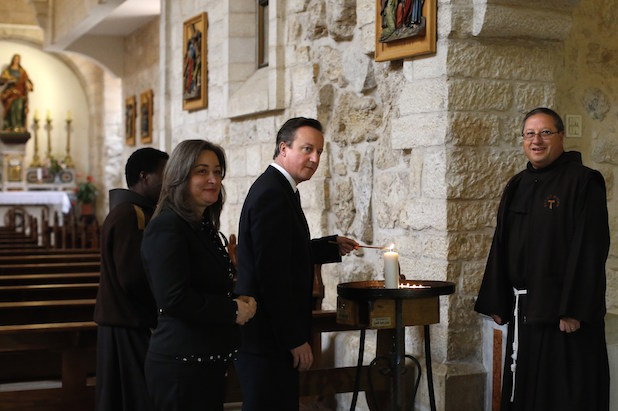David Cameron has written a rather interesting piece for Premier Christianity magazine on his faith and the meaning of Easter. I use the word ‘interesting’ advisedly and in the sense that an aged relative might deploy it when regarding some new fangled Christmas present that has a touch screen. The final two paragraphs are particularly interesting:
‘So I end my argument with this: I hope everyone can share in the belief of trying to lift people up rather than count people out. Those values and principles are not the exclusive preserve of one faith or religion. They are something I hope everyone in our country believes.
‘That after all is the heart of the Christian message. It’s the principle around which the Easter celebration is built. Easter is all about remembering the importance of change, responsibility, and doing the right thing for the good of our children. And today, that message matters more than ever.’
This is very interesting. Because generally the heart of the Christian message is considered to be a man called the son of God dying in agony on a cross and then rising from the dead, saying he was taking a punishment that men deserved. Lots of people don’t like that message, others think it’s just not true, but generally that’s the crux, if you pardon the pun, of it. I say generally because like a lot of people in this country I was educated at ‘Christian’ schools that emphasised the ‘doing the right thing for the good of our children’ stuff as being at the ‘heart of the Christian message’ rather than any of the horrible Easter stuff, along with an admirable attempt to relate almost all sections of the Bible to one part or another of the school’s code of conduct (e.g ‘The Parable of the Ten Virgins means don’t run in the corridors and do what the prefects tell you’, and so on).
The whole ‘doing the right thing for the good of our children’ isn’t the heart of the Christian message and to say so is rather patronising to people who aren’t Christian as they are as likely to want to do the right thing for their children and be responsible and so on as someone who pitches up to an ornate building every Sunday.
The Prime Minister seems quite keen on that why-can’t-we-all-get-along message of Christianity, which is the one Justin Welby recently dismissed as ‘moral claptrap’, as it’s not really the heart of Christianity at all. It is of course much easier to claim that it is, because the be-nice-and-look-after-your-kids message is one that most people tend to agree with, whereas any stronger message can end up offending people. And offending people isn’t a good plan during a General Election. Though it’s odd that the Prime Minister has chosen to offer the most sanitised version of Christianity possible to a Christian magazine that is presumably read by people who quite like the ‘other’ heart of the Christian message stuff about the cross and the Resurrection and so on.
As it happens, in the forthcoming Spectator Michael Gove has written for us about the ‘pity, condescension or cool dismissal’ that Christians in contemporary Britain experience. You can read that piece tomorrow (subscribe to the magazine from just £1 a week here), as well as listen to my interview with him on our podcast. Perhaps Cameron, fearing that sort of pity, condescension or cool dismissal from the non-churchgoing population, decided to keep his explanation of the Christian message as sanitised as possible. Or perhaps a spin doctor wrote this for him and he was too busy to check.
Perhaps the truth is that it’s OK if you say you’re a Christian, but you still shouldn’t appear to believe too much more than anyone else does, sticking to stuff about turning the other cheek, rather than the things about God doing stuff. Like raising his son from the dead. That kind of stuff is a bit awkward, so best leave it out. Though of course, the more you talk about something, rather than shuffle away awkwardly from it, even if you believe it to be true, the less weird it becomes.
In 2006, the Spectator surveyed leading figures in politics, the media and the church on whether they believed Jesus really rose from the dead. Tony Blair’s office said he didn’t take part in surveys, Cameron’s didn’t reply either. Mind you, neither did Rowan Williams’ team, who said ‘we don’t take part in compare-and-contrast surveys’, which was interesting (again within the strict definition of interesting that this article has used so far).
So there does seem to be a reluctance to talk about what is, at least officially, the heart of the Christian message, in case it offends people. Perhaps that makes sense for politicians who are after all not vicars and who seek votes, not souls. But it still seems odd for a politician seeking to avoid confrontation over religion to claim to define the heart of a religion.







Comments